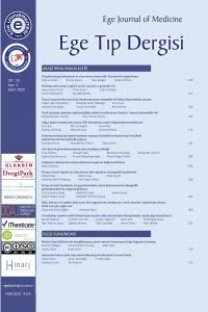Hepatocyte regeneration in hepatitis B virus-related chronic liver disease revealed by proliferating cell nuclear antigen
Prolifere hücre nükleer antijen, Hepatit B, Hepatit B virüsü, Karsinom, hepatosellüler, Karaciğer sirozu, Kronik hastalık, Karaciğer hastalıkları
Proliferating Cell Nuclear Antigen, Hepatitis B, Hepatitis B virus, Carcinoma, Hepatocellular, Liver Cirrhosis, Chronic Disease, Liver Diseases,
- ISSN: 1017-7698
- Yayın Aralığı: 3
- Başlangıç: 2018
- Yayıncı: Ege Üniv. Tıp Fak.
Bilateral congenital lobar emphysema associated with imperforate anus "Case report"
Fuat GÜRKAN, Bünyamin DİKİCİ, MEHMET BOŞNAK, Metin KILINÇ, Mustafa ÖZATEŞ, Ali İhsan DOKUCU
Changes in cystometric parameters in healthy postmenopausal women treated with ERT
Remzi GÖKDENİZ, Emin ÖZBEK, Murat SOYLU, Nursel BAZOĞLU
Belhhan AKPINAR, Mustafa GÜDEN, Bülent POLAT, Ertan SAĞBAŞ, Emine CAKALI, Osman BAYINDIR, Bingür SÖNMEZ, Cemi DEMİROĞLU
The role of mast cell histamine content in the thermoregulatory effect of morphine in mice
AHMET ULUGÖL, Hakan Ç. KARADAĞ, DİKMEN DÖKMECİ, TURHAN DOST, İsmet DÖKMECİ
